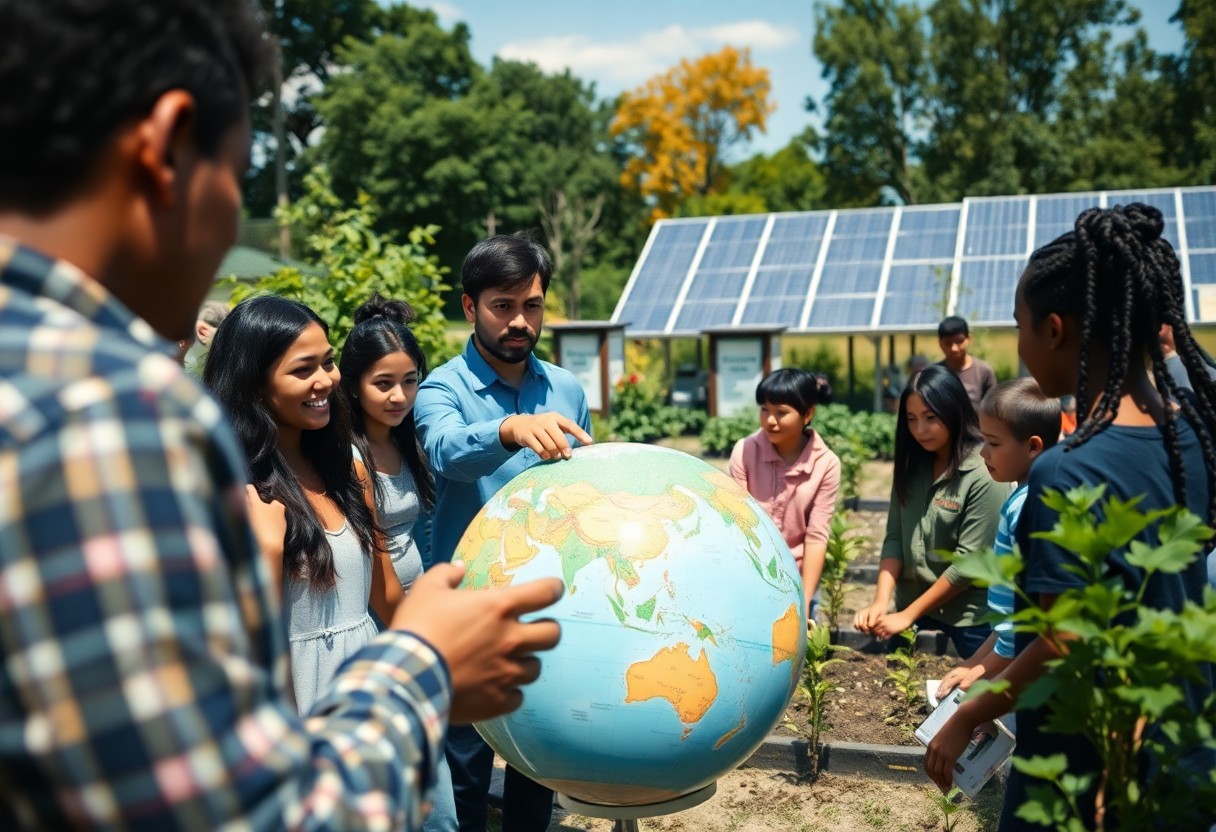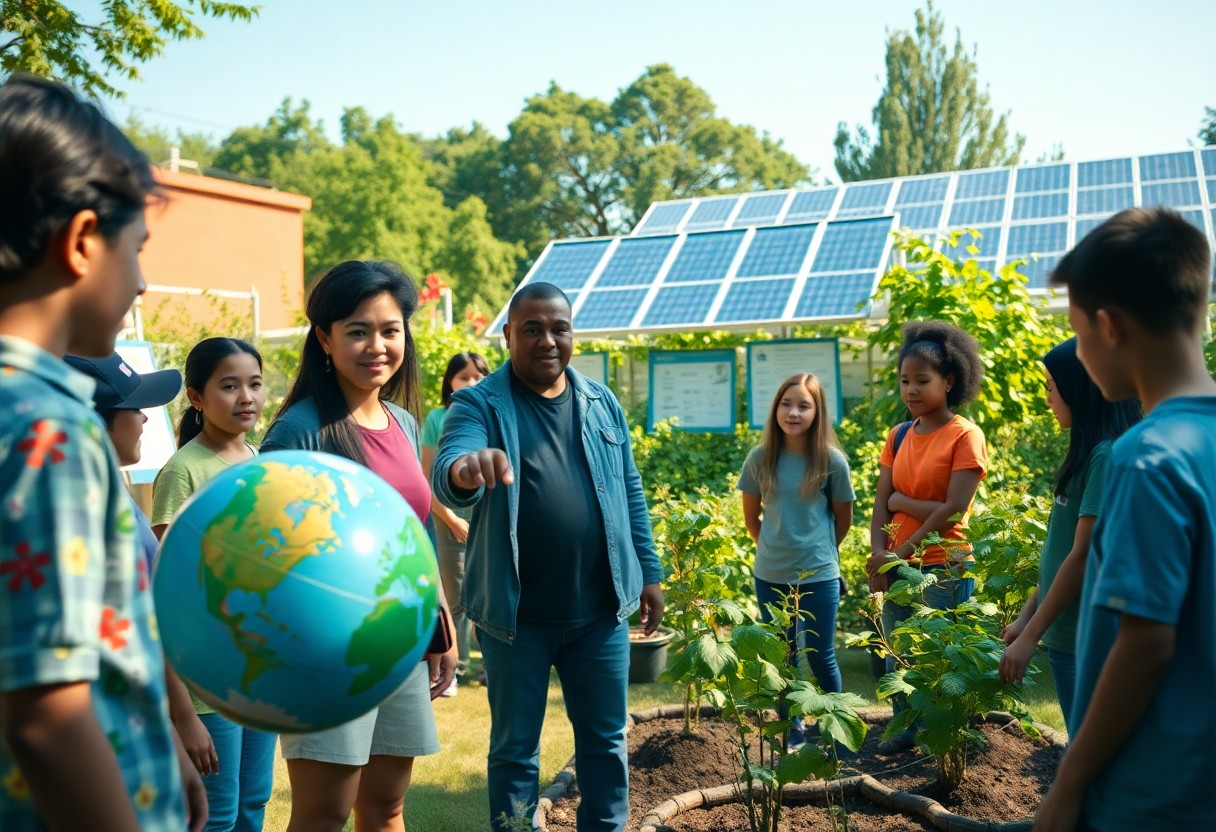Most individuals passionate about sustainability and education might find pursuing a Master of Environmental Education (MEE) to be an enriching opportunity. This advanced degree prepares you to inspire others about environmental issues through innovative teaching strategies and diverse educational settings. As you explore the complexities of ecology, conservation, and pedagogy, you will gain the skills needed to effectively communicate and promote environmental stewardship. Whether aiming for a career in formal education or community outreach, an MEE equips you to make a meaningful impact in today’s world.
Key Takeaways:
- The Master of Environmental Education (MEE) program emphasizes interdisciplinary approaches, integrating ecology, sustainability, and pedagogy to equip educators with the skills needed to teach about environmental issues effectively.
- The curriculum often includes hands-on learning experiences, field studies, and community engagement, fostering a practical understanding of environmental concepts and promoting active involvement in conservation efforts.
- Graduates of the MEE program are prepared for diverse roles in education, advocacy, research, and policy, empowering them to lead initiatives that influence public awareness and action regarding environmental challenges.

The Role of MEE in Global Environmental Stewardship
Your journey as a Master of Environmental Education (MEE) places you at the forefront of global environmental stewardship. Guiding diverse groups in understanding and addressing environmental challenges fosters a greater sense of responsibility and action. By integrating sustainable practices and promoting conservation ethics, you enable communities to engage actively in fostering healthier ecosystems. Your role extends beyond simply imparting knowledge; it encompasses inspiring individuals to become proactive stewards of the planet, bridging the gap between education and environmental action worldwide.
Defining Environmental Education and Its Importance
Environmental education encompasses a holistic approach to understanding the relationship between human beings and their natural surroundings. It instills a sense of awareness about ecological issues and cultivates critical skills for problem-solving. Essential for shaping informed citizens, environmental education promotes sustainable practices, empowering individuals to understand their impact on the planet. As you engage with communities, the ripple effects of this education lead to more sustainable decisions, fostering not only personal growth but also collective change.
The Evolving Duties of a Master of Environmental Education
Your responsibilities as a Master of Environmental Education continually adapt to the shifting landscape of global environmental challenges. Alongside traditional teaching roles, you now incorporate technology, outreach activities, and community partnerships into your strategies. Collaboration with local organizations is pivotal for driving awareness campaigns, while leveraging social media enhances educational reach. Furthermore, advocating for policy changes and environmental justice becomes part of your mission, equipping you to tackle pressing issues such as climate change, biodiversity loss, and urban sustainability more effectively.
In today’s interconnected world, the evolving duties of a Master of Environmental Education require versatility and innovation. You not only deliver curriculum but are also called to create engaging, multidisciplinary programs that address current and emerging environmental issues. This includes crafting experiential learning opportunities that connect theory to real-world applications, encouraging learners to take part in local conservation efforts or sustainability initiatives. Staying informed about the latest environmental science and education methodologies ensures you remain a key facilitator in bridging knowledge gaps and promoting informed action in your community.
Curriculum Design: Building the Next Generation of Environmental Leaders
In your role as a Master of Environmental Education (MEE) graduate, you are equipped to design curricula that empower students to tackle pressing environmental challenges. This involves creating engaging, hands-on learning experiences that foster critical thinking, promote environmental literacy, and encourage active participation in sustainability practices. By focusing on real-world applications and community engagement, your curriculum can inspire the leaders of tomorrow to innovate and advocate for positive change in their local and global environments.
Key Components of an Effective Environmental Education Program
An effective environmental education program integrates experiential learning, local ecological knowledge, and community involvement. By prioritizing interactive activities such as field trips, citizen science projects, and partnerships with local organizations, you create an engaging and relevant educational experience. Emphasizing skills such as problem-solving, teamwork, and personal responsibility not only enhances understanding but also empowers learners to take actionable steps in their communities.
Integrating Interdisciplinary Approaches for Holistic Learning
Interdisciplinary approaches to environmental education enrich learning by connecting ecological principles with social, economic, and political contexts. Utilizing subjects like science, geography, art, and ethics, you can create a multifaceted curriculum that resonates with diverse student interests and backgrounds. This integration cultivates a comprehensive understanding of environmental issues, enabling learners to appreciate the complexities surrounding sustainability and develop innovative solutions grounded in a broad perspective.
Bringing together various disciplines allows you to present environmental issues through multiple lenses, fostering collaboration and critical thinking. For instance, a project examining local water quality can incorporate scientific measurements from chemistry, artistic representations through photography, and discussions on ethics regarding water rights. By doing so, you equip students with the skills necessary to analyze problems critically, advocate for sustainable practices, and recognize the interconnectedness of environmental, social, and economic factors. This holistic approach not only deepens understanding but also instills a sense of responsibility for one’s actions in promoting a more sustainable future.
Innovative Teaching Strategies: Engaging Minds and Inspiring Action
Your ability to incorporate innovative teaching strategies can transform the way learners engage with environmental issues. By fostering critical thinking and encouraging creativity, these approaches not only inspire students but also encourage them to take real action in their communities. Methods like project-based learning, collaborative activities, and inquiry-based exploration make environmental education relatable and actionable, igniting a passion for stewardship and sustainability that extends beyond the classroom.
Experiential Learning Methods that Make an Impact
Experiential learning, through hands-on activities such as field trips and community service projects, creates memorable experiences that foster a deeper understanding of environmental concepts. Engaging directly with nature allows you and your students to observe, reflect, and apply knowledge in real-world contexts. This immersive approach cultivates not just understanding but also a sense of responsibility and connection to the environment, empowering learners to effect change in their communities.
Utilizing Technology to Enhance Environmental Education
Implementing technology in environmental education opens doors to innovative learning opportunities. Tapping into online platforms for virtual field trips, interactive simulations, and collaborative projects can enhance engagement and accessibility in your curriculum. These tools enable diverse learners to connect with environmental topics, share experiences, and access a wealth of information, all while nurturing a collaborative spirit among peers.
Utilizing technology effectively hinges on choosing the right tools to suit your educational goals. For example, GIS (Geographic Information Systems) applications allow students to analyze environmental data visually while engaging in real-world problem-solving. Additionally, platforms like Google Earth offer interactive ways to explore ecosystems globally. These digital resources not only facilitate learning but also enhance students’ abilities to communicate and advocate for environmental issues, fostering a connected and informed generation ready to tackle the challenges of tomorrow.

Challenges and Opportunities in the Field of Environmental Education
Your journey in the field of environmental education presents unique challenges and opportunities that can significantly shape both your career and the impact you have on communities. With increasing focus on environmental issues, there is a growing demand for effective educational programs. However, navigating institutional barriers, securing funding, and addressing diverse audience needs can complicate your efforts. By strategically overcoming these challenges, you can create impactful learning experiences that resonate with various demographics and contribute to a sustainable future.
Navigating Policy and Funding Barriers
Securing funding and adhering to policies can hinder the effectiveness of environmental education initiatives. Grant application processes often require extensive documentation and justification, leading to delays and uncertainty. You must familiarize yourself with available grants, governmental organizations, and non-profits dedicated to supporting environmental education. Additionally, staying updated on local and national policies will prepare you to advocate for necessary changes or support, ultimately amplifying your impact and ensuring sustainable funding for your programs.
Addressing Diverse Audiences and Cultural Sensitivities
Engaging a diverse audience in environmental education requires an understanding of cultural sensitivities and varying backgrounds. Tailoring your approach means considering language, traditions, and local knowledge that inform community views on environmental issues. By integrating culturally relevant content and participation methods, you can foster a deeper connection with your audience, ensuring inclusivity in your programs. Incorporating local perspectives enhances relevance and effectiveness, as studies indicate that culturally responsive education can significantly increase community interest and participation in environmental initiatives.
Fostering inclusion among diverse audiences necessitates a personalized approach that values different cultural narratives and experiences with the environment. Understanding local ecological practices and respecting traditional knowledge not only empowers communities but also enriches your educational strategies. For instance, collaborating with Indigenous groups to incorporate traditional ecological knowledge into your curriculum can resonate more deeply with the community, inspiring meaningful action. Additionally, using multiple languages or visual aids can make your programs accessible to varying literacy levels and backgrounds. This investment in cultural sensitivity ultimately cultivates a more engaged and informed citizenry, reinforcing the importance of collective environmental stewardship.
Career Pathways: From MEE Graduate to Change-Maker
Your journey as a Master of Environmental Education (MEE) graduate opens a multitude of pathways that position you as a catalyst for change in environmental awareness. Whether you become an educator in schools, a program director for non-profits, or an advocate for policy reform, your expertise allows you to bridge the gap between scientific knowledge and public engagement. Graduates have successfully transitioned into roles in governmental agencies, museums, and community organizations, each contributing uniquely to the movement for a more sustainable future.
Diverse Professional Opportunities in Environmental Education
Building a Network for Collaboration and Influence
To wrap up
To wrap up, pursuing a Master of Environmental Education (MEE) equips you with the knowledge and skills needed to effectively engage and inspire others about environmental issues. This program empowers you to facilitate learning experiences that promote sustainability and conservation, ultimately preparing you for various roles within education, nonprofits, and community outreach. By obtaining this degree, you position yourself as a leader in fostering environmental awareness and stewardship, enabling you to make a significant impact in your community and beyond.

